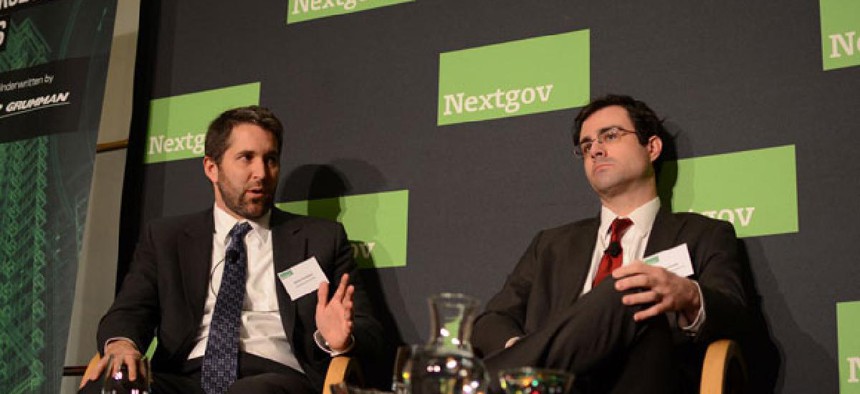Prospects for Comprehensive Cyber Reform Are Questionable

Kevin Gronberg, left, and Andrew Grotto discussed the need for cybersecurity reform. Sarah Scully/Nextgov.com
Nonetheless, there is bipartisan agreement on the need for better information sharing about threats to critical networks.
Congress is unlikely to pass a comprehensive cybersecurity reform bill this year, largely because public concern about computer hacking doesn’t sway elections, a recently-departed House Homeland Security Committee senior aide said. That prospect is likely to change only after an event involving major property damage, casualties and a direct connection to malicious network activity, said Kevin Gronberg, who as former senior counsel to the committee, helped draft key cybersecurity legislation that failed in 2012.
“As of yet, cyber still does not win votes,” said Gronberg, who stepped down after the 2012 election. “It will always be one of those issues that politicians will be able to push aside [in favor of] the issue of the day -- such as sequestration,” he said. “That's how these Congress members keep their jobs." Gronberg, now a private consultant, spoke during a discussion hosted by Nextgov .
Andrew Grotto, a staffer for the Senate Select Committee on Intelligence, took a less pessimistic view: “I’m not sure we need a 9/11-like incident to yield legislation,” he said.
Earlier this week, in a speech at Georgetown University, Defense Secretary Leon Panetta took lawmakers to task for failing to pass reforms in 2012 that would help the Pentagon and other agencies respond to a critical national security imperative: “Cyber is now at the point where the technology is there to cripple a country, to take down our power grid system, to take down our government system, take down our financial system and literally paralyze the country,” he said.
“We’ve asked for legislation from the Congress to try to give us the tools we need – the tools we need so that we can develop a partnership with the private sector to be able to confront those challenges,” Panetta said.
Last year, industry rejected a committee bill that so-called critical infrastructure companies argued was intended to regulate their private computers undergirding transportation, energy and other vital systems. Committee Chairman Rep. Michael McCaul, R-Texas, said in December he would gain corporate buy-in for new legislation and prioritize passage.
A bipartisan information-sharing bill the House passed in 2012, the Cyber Intelligence Sharing and Protection Act, or CISPA, did not win over the White House or privacy advocates who feared companies and agencies would use new authority to inappropriately peer into customer information. In January, Senate Democrats reintroduced a reform bill that failed in 2012 -- the Cybersecurity and American Cyber Competitiveness Act -- that would create voluntary security standards for critical sectors. The bill ran into resistance last year after the U.S. Chamber of Commerce claimed that the government would eventually mandate those regulations by denying contracts to companies that do not implement the controls.
Executives from major companies now say they would be comfortable with voluntary standards, despite the chamber’s earlier dissent, said Sen. Jay Rockefeller, co-sponsor of the bill and chairman of the Commerce, Science and Transportation Committee. Last week, Rockefeller released a poll of chief executive officers from the 500 largest U.S. companies that found many support a voluntary federal program for developing cybersecurity best practices. Financial institutions, retailers and other businesses during the past year have detected -- and for the first time publicly disclosed -- network intrusions, suggesting an increasing willingness to share information that may help thwart and mitigate attacks.
Grotto said the views of corporate executives are changing. Companies now routinely contact members of Congress to share concerns about computer security and economic espionage. Asked if he thought Panetta was overstating the threat, Grotto said, “No, I don’t.”






